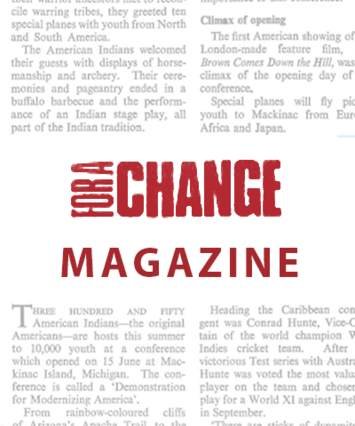Take a journey to the west or north-west of Guatemala City where the land rises and the nights become cooler. As you pass through Guatemala's abundant forests, you notice the trees that have been felled on each side of the road - to prevent ambushes, evidence of the warfare in recent years.
Since January 1986, following the democratic election of President Vinicio Cerezo's government, relative peace has been established, although an estimated 3,000 guerrillas have not surrendered and engage in occasional skirmishes with the army. In some places the so-called 'armed civic patrols' can be seen, a reminder that violence is still a threat.
Here, in the villages which nestle between the takes and mountains, live most of Guatemala's Indians, who make up 60 per cent of the population. In their colourful hand-woven and embroidered costumes they represent a culture with different values to the Hispanics who have dominated the country since the 16th century. The relationship between these two cultures, embittered by centuries of exploitation, is the vital issue now facing this war-torn country.
Gaspar Gonzales is an Indian, head of the National Council of Mayan Development which aims to unite the 23 different Indian tribes on a cultural level. He lost his brother in the war between the guerrillas and militia. In those days villages would be occupied by first one group then another, demanding food and allegiance, and taking reprisals against those who had been forced to assist 'the enemy'. Now an Indian "Widows Cooperative" exists to help the families that remain.
Gonzales believes that the Indians have much to give to the world through their culture, and is writing a book about the history and traditions of his people. He himself has tried the path of violent change but no longer believes that this is the answer. Now, together with Ana Maria Xuya Cuxil, he has been participating at a conference for Moral Re-Armament in Panajachel on the themes of 'forgiveness' and 'bringing people together'. Miss Xuyd lost her mother and her only brother in the earthquake of 1976 which destroyed whole towns and villages. She and her four sisters survived, crawling out from the pile of rubble that had been their home. Now 25 years old and a schoolteacher, she has become Guatemala's first Indian woman Member of Parliament.
Despite the fact that Indians make up the majority of the population, they only have nine of the 100 seats in parliament. Miss Xuya did not want to enter politics. Politicians here run many risks. 'I was afraid,' she says, 'but I felt that it was God's will.'
Faith is important to her as to many in this staunchly Catholic country. 'When a person of leadership or of public responsibility does not have God in his life, he loses direction and is lost,' she says. For Miss Xuya, her life's 'direction' is bound up with her people, for whom she has profound love and conviction. She is an able and passionate spokesperson, expressing the Indians' desire to build a united Guatemala with equal opportunities for all. The fighting may have stopped, 'but,' she says, 'you can also kill people by excluding them from society, refusing them the rights from which others benefit.'
Don Feliciano Poc, a sculptor and poet, is also the only mayor in the country elected on a socialist ticket. He took a big group from the conference in Panajachel on an official visit to his township. For an hour the group crossed Lake Atitlan with volcanoes rising from the mist all around. Town-criers had gone throughout San Pedro announcing the visit and so 1,000 villagers lined the streets to hear their mayor speak, sitting on the stone steps that serve as benches, in traditional Indian regalia. Addressing them in their own language (Tzutuhil) he told them about the conference he had attended which was so different from other conferences. He was followed by people of different nations speaking or being translated into Spanish. Although many would not have understood the words, the feelings behind were apparent.
Such encounters highlight the need for translators. And yet something more than linguists is needed. In Guatemala City the heavy iron gates that protect some of the houses bear witness to the divisions that exist. Somehow it is translators of the heart, people who can translate from one way of life to another, who are really needed here.


